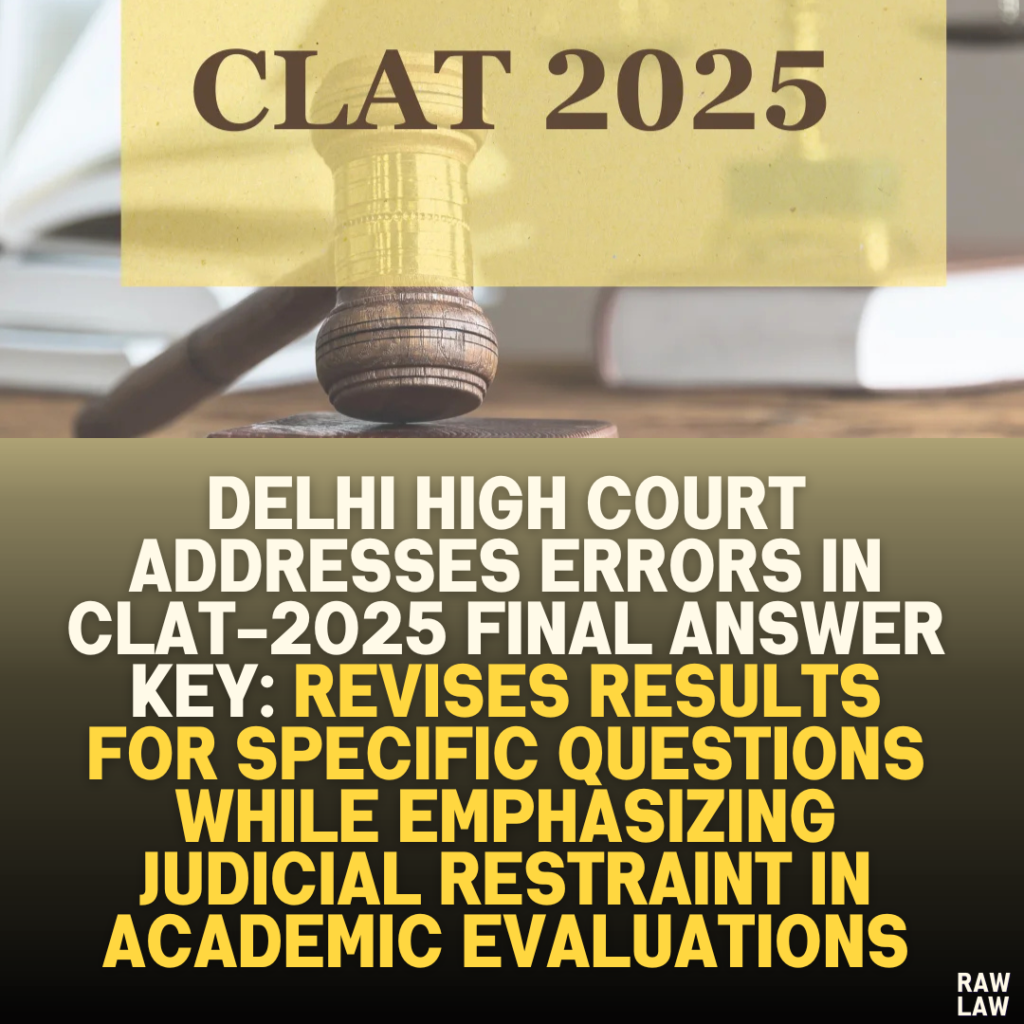Court’s Decision:
The Delhi High Court partially allowed the writ petition challenging the CLAT-2025 final answer key. The court:
- Revised the petitioner’s score by awarding marks for Question 14, where the court found the answer key demonstrably incorrect.
- Directed the exclusion of Question 100 from evaluation, as the correct answer was missing from the options provided.
- Declined to interfere with other challenged questions, deferring to the expertise of the committees involved in the examination process.
Facts:
The petitioner, a minor who appeared for the CLAT-2025 examination, challenged the final answer key for specific questions in the Set-A paper. He raised objections to the final answers for Questions 14, 37, 67, 68, and 100 on grounds of inaccuracy.
- The petitioner submitted that the errors in the answer key led to the deduction of marks, adversely impacting his rank.
- While his current score (87 marks) secured him a rank of 898, he argued that a correction in the challenged questions would increase his marks by five, significantly improving his rank and facilitating admission to a top-tier NLU.
- The respondent (Consortium of National Law Universities) contended that the final answer key was determined through a rigorous review process by an Expert Committee and an Oversight Committee. The committees considered over 5,000 objections from candidates.
Issues:
- Were the objections raised by the petitioner regarding the final answer key valid and supported by evidence?
- To what extent can the judiciary interfere in academic decisions such as the correctness of examination answer keys?
- Should the results of other candidates be altered if a demonstrable error is found in the answer key?
Petitioner’s Arguments:
- Question 14: The petitioner argued that “Auctioneers of cheap Bags” (Option C) was the correct answer, as the other options represented trades explicitly mentioned in the comprehension passage.
- Question 37: Asserted that the Nari Shakti Vandan Adhiniyam Act, 2023, would come into force after the census. Therefore, “Option C” was correct.
- Question 67: The petitioner contended that agreements with minors are void under the Indian Contract Act, 1872, relying on the landmark ruling in Mohori Bibee v. Dhurmodas Ghose.
- Question 68: Argued that a contract with a minor is inherently void, making “Option D” the most appropriate answer.
- Question 100: Claimed that the correct answer, “Sohan,” was not included in the options, making the question invalid.
Respondent’s Arguments:
- The respondent highlighted its multi-layered evaluation process, which included:
- An Expert Committee composed of academicians and professionals from diverse fields.
- An Oversight Committee, which reviewed the Expert Committee’s findings and approved the final answer key.
- The respondent contended that:
- Question 14: “Sellers of stolen hardware” (Option D) was correct, as illegal activities cannot be classified as trades or occupations.
- Question 68: “Agreement to pay ₹10 lakhs on getting a government job” (Option C) was the correct answer because it involved bribery and was void as per public policy.
- For Questions 67 and 100, the respondent argued that the petitioner’s interpretations were incorrect and urged the court to adopt a “hands-off approach” in academic matters.
Analysis of the Law:
The court analyzed the applicable principles of judicial review in academic matters, relying on precedents:
- Ran Vijay Singh v. State of Uttar Pradesh (2018): Courts should presume the correctness of answer keys unless errors are glaring and demonstrable without inference.
- Kanpur University v. Samir Gupta (1983): Judicial interference should be limited to exceptional cases where the answer key is patently wrong.
- Rahul Singh v. Uttar Pradesh Public Service Commission (2018): Courts should not act as appellate bodies for expert opinions unless there are blatant errors.
The court held that academic matters are best left to experts unless demonstrable errors cause clear injustice.
Precedent Analysis:
The court examined prior rulings, including:
- Vikesh Kumar Gupta v. State of Rajasthan (2021): Judicial restraint is necessary when expert committees have reviewed disputed questions.
- State of Tamil Nadu v. K. Shyam Sunder (2011): Courts lack the expertise to adjudicate academic disputes and must defer to expert bodies.
The court reiterated that judicial intervention must be sparingly applied, focusing on cases of manifest error.
Court’s Reasoning:
- Question 14:
- Based on the comprehension passage, the petitioner’s choice (“Option C: Auctioneers of cheap Bags”) was correct.
- The respondent’s argument that illegal activities are not trades was deemed irrelevant in the context of a language test.
- The court found the Oversight Committee’s rejection of the Expert Committee’s recommendation to update the answer key unjustified.
- Question 100:
- The seating arrangement puzzle had a clear correct answer (“Sohan”), which was not provided in the options.
- The Expert Committee recommended withdrawing the question, but the Oversight Committee disagreed without sufficient justification.
- The court excluded the question, aligning with the Expert Committee’s advice.
- Other Questions:
- For Questions 37, 67, and 68, the court found no demonstrable errors and deferred to the committees’ expertise.
- The court emphasized that disagreements requiring interpretative reasoning do not warrant judicial intervention.
Conclusion:
The court partially allowed the petition:
- Marks for Question 14 were awarded to the petitioner and other candidates who selected Option C.
- Question 100 was excluded from the evaluation.
The court dismissed objections to other questions, reiterating the principle of judicial restraint in academic evaluations.
Implications:
This judgment underscores the judiciary’s limited role in academic disputes, affirming the sanctity of expert committees’ decisions while ensuring fairness in cases of manifest error. It highlights the need for robust internal review mechanisms to prevent such disputes.
